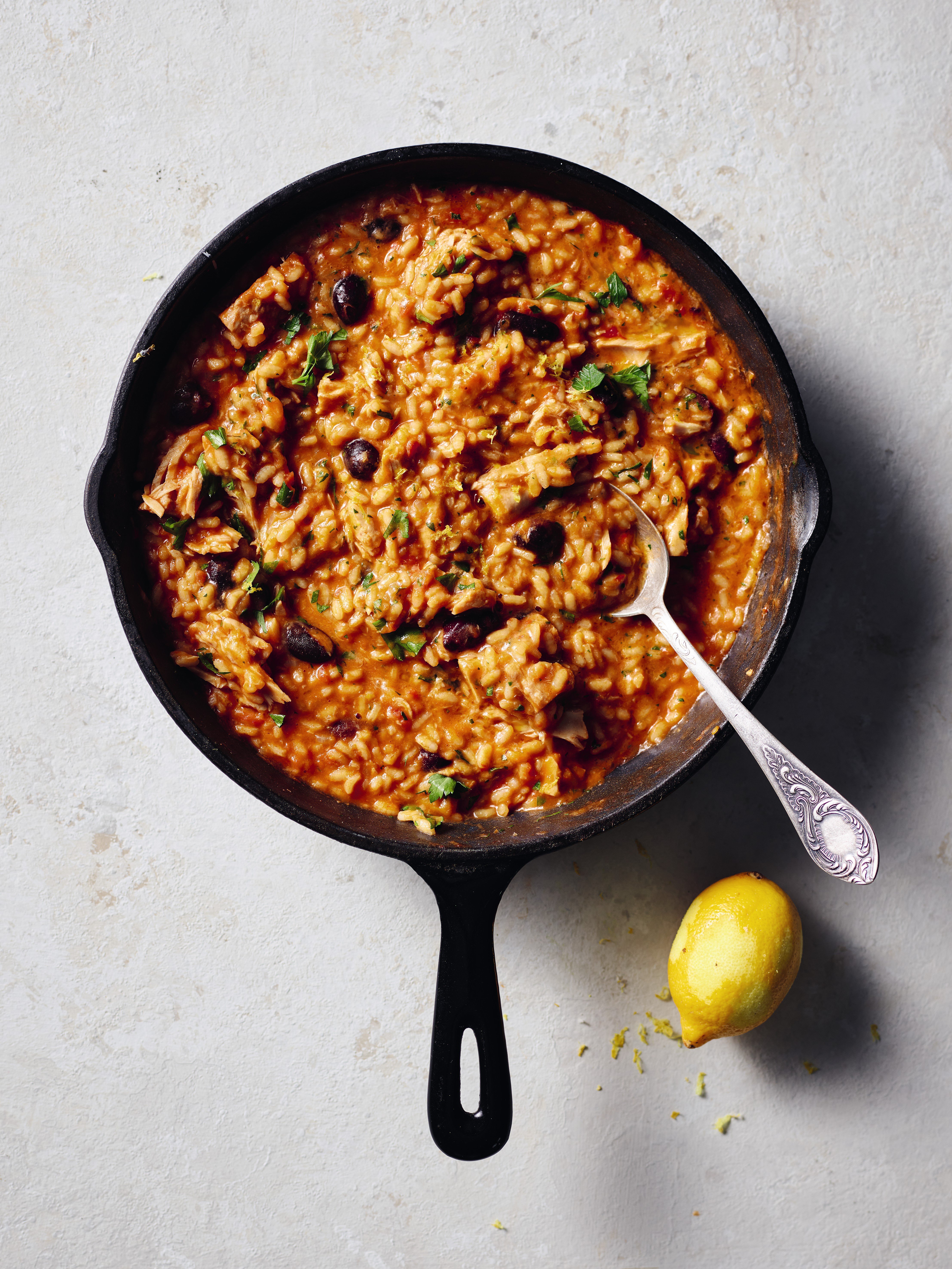
The Australian couple, who own The Fishmonger’s Son in Melbourne’s Carlton North, have found while many Australians love seafood they are reluctant to cook it at home - a similar issue found in New Zealand as well.
So they have created a cookbook, named for their fishmongery, including step-by-step instructions for the basics, like shucking oysters and peeling prawns as well as recommendations for the best seafood for curries, barbecuing and crumbing.
It all began for them with Yotis’ father, Kon, who supplied fresh fish at the Footscray Wholesale Market for 40 years. Yotis worked alongside his father for many years, often venturing out and exploring different trades but always going back to the family business.
Yotis always dreamed of owning his own seafood shop and that came to fruition when he met his future wife and they began to plan a place that would be connected to their Greek and Italian cultures, coining the phrase ‘‘seafood deli’’.
They opened in 2018 featuring not only fresh fish but seafood often found in a delicatessen like anchovies and other smoked, pickled and canned fish.

‘‘We wanted our shop to be an unpretentious space where shoppers can pick up all the ingredients to create a great seafood meal for a midweek dinner or special occasion.’’
They agreed to only stock items they have personally tried and love and used the same approach for the recipe book.
‘‘Many of the recipes are inspired by how we cook at home, how we celebrate and entertain with seafood. There are treasured family recipes we have grown up with such as Laura’s mum’s tuna risotto with tomato and olives and Anthony’s family favourite, avgolemono fish soup and others that have come from talking to our customers and learning how they cook at home.’’
The book includes a list of their favourite fish and shellfish for the home cook of easily available species, although with an Australian focus.
There are also instructions on how to skin a fish fillet, advice on the best fish for sashimi and how to wash mussels.
THE BOOK
This is an extract from The Fishmonger’s Son, by Anthony Yotis and Laura di Florio Yotis (RRP $49.99, MacMillan)

Tuna risotto with tomato and olives
Serves 3 to 4
2 litres fish or vegetable stock (cubes or store-bought are fine for this recipe)
2 Tbsp extra-virgin olive oil
1 small brown onion, finely chopped
2 to 3 anchovies
1 small red chilli, deseeded and finely chopped (optional)
250g arborio rice
125ml (½ cup) white wine
400g can chopped tomatoes
425g can tuna in olive oil, drained
Handful of pitted Kalamata olives
1 tsp salted butter
50g grated pecorino, plus extra to serve
½ bunch of flat-leaf parsley, leaves, picked and chopped
Zest of 1 lemon
Salt flakes and freshly ground black pepper
Method
Prepare the stock in a pot on the stove and keep it simmering gently on the lowest heat.
Heat the olive oil in a large non-stick saucepan over medium heat.
Add the onion, anchovies and some chilli if you like, and cook down until the onion has softened and the anchovies have disintegrated.
Add the arborio rice and gently brown for 2-3 minutes, stirring, then add the wine, allowing the alcohol to cook off.
Add the tomato next.
Once the moisture has all been absorbed by the rice, start to add the stock, one ladle at a time, allowing it to absorb before adding more.
Keep repeating this for around 15-20 minutes until the rice is al dente and almost done. Remember to keep stirring so the rice doesn’t stick.
Add the tuna and olives to the pot, stirring through.
At this point we like to add a last ladle of stock, turn off the heat and pop a lid on (slightly ajar) to finish off the cooking process.
You want the risotto to have a slight firmness and not be mushy.
After letting the risotto sit in the pot for 5 minutes, add the butter, pecorino, parsley, lemon zest and seasoning, to taste, then stir through.
Place the pot directly on the table and serve into individual bowls... a second plate is obligatory, as is an extra sprinkle of pecorino.

Floured fried seafood
Serves 4
200g plain flour mixed with:
⅔ teaspoon sea salt and
⅔ tsp freshly ground black pepper
Zest of 1 lemon
Olive oil for deep frying
Salt flakes, to serve
Lemon wedges, to serve
Good-quality aioli, to serve
Choose from list below (you will need 400g in total)
200g fresh calamari hoods, including tentacles, cleaned
200g raw prawns, peeled, deveined and butterflied, tails on
200g white fish fillets (flathead, garfish, King George whiting, rock ling, etc.)
200g local scallop
Method
Place the seasoned flour in a deep bowl and mix in the lemon zest.
Heat the olive oil in a frying pan over medium-low heat. We rarely fry seafood on a high heat - always aim for medium-low heat for consistent results.
Flour the fish or shellfish using your hands.
Drop small batches of fish or shellfish into the oil - don’t crowd the pan or it will cool the oil. The fish or shellfish needs to cook to a golden brown to ensure even cooking (see approximate cooking times below). The oil should be hot enough to get an instant sizzle but should not be smoking.
If it’s getting too hot, turn the temperature down. Once golden and cooked, remove the fish or shellfish with a slotted spoon and place on a plate lined with some paper towel to drain. Repeat until all of it is fried.
If the oil gets too ‘‘floury’’, empty the pan and add fresh oil - fresh oil gives you the best outcome.
Sprinkle the fried fish or shellfish with salt flakes and serve with lemon wedges and some good aioli.
Cooking times
Calamari: 2 to 3 minutes; look for a light golden colour and watch it carefully as it firms up.
Prawns: 3 to 4 minutes; they will curl up tightly and turn pink - look for even colour.
White fish: 3 to 4 minutes, though thicker fish will take an extra 1-2 minutes; look for a light golden colour and bright white flesh.
Scallops: 2 to 3 minutes; look for a golden colour - they will firm up and should be tender when touched.

Sesame prawn sausage rolls
Makes 8
500g raw prawn meat, finely chopped or minced
60g breadcrumbs
2 to 3 spring onions, finely chopped
1 shallot, grated (or ½ small onion)
3 garlic cloves, grated
1 tsp grated ginger
1 egg white
50ml sesame oil
2 tsp hoisin
1 Tbsp cornflour
1 to 2 tsp soy sauce
155g sesame seeds
2 sheets puff pastry
1 egg, beaten, for egg wash
Sweet chilli sauce or sriracha, to serve
Method
Preheat the oven to 200°C (conventional) and line a baking tray with baking paper.
Place the prawn meat in a large bowl with the breadcrumbs, spring onion, shallot, garlic, ginger, egg white, sesame oil, hoisin, cornflour and soy sauce. Mix to combine.
Place the sesame seeds in a shallow bowl.
Cut each puff pastry sheet into quarters and divide the prawn mix equally among the pastry pieces, rolling the mixture into a sausage shape in the centre of each piece.
Brush the edges with egg wash, then roll the pastry up to create the rolls. Brush the rolls with egg wash and dip the top side into the sesame seeds.
Transfer to the baking tray and bake for around 20 minutes, until golden.
Remove from the oven and leave to cool a little before serving with some sweet chilli sauce or sriracha.













